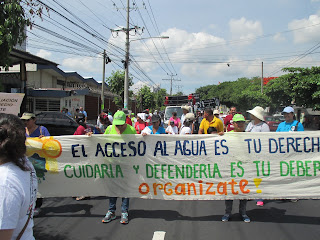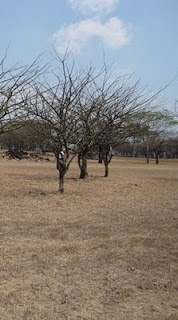The Right to Water
"They shut off my water. We have no water in the house."
Three generations of adults and children, including a newborn and a few others under age 2 live in the house -- maybe 19 or 20 people -- all with no water. No water for drinking or cooking. No water for bathing or washing clothes. No water for sprinkling on the floor to hold down the dust or on the plants so they produce fruits. No water.
"I have a debt. Finally they shut off the water. I don't know in what way I will ever be able to pay this debt. Everything fell apart all at once. I don't know how we will resolve this situation."
The water system in the community is owned and operated by ANDA, the public water utility in El Salvador. Water is metered and bills are sent out on a monthly basis. Most people go to local banks to pay their water bills in person.
The debt is more than $400. The water source is a spigot at the corner of the tiny lot. The family fills a 50-gallon drum and uses water one small bucketful at a time. Even with multiple families living under one roof, it seems impossible that a household with a pit toilet and with no sink and no shower could use that much water.
This water story began with a bill of $75 or $80. (An average bill might be more in the neighborhood of $2 to $5 in a month.) The homeowner, a single mother and matriarch of the clan, filed complaints that the numbers on the bill did not match the numbers on the meter. She filed a complaint in person which produced the response: pay your bill. Someone came out to the house twice and verified that the numbers on the meter and the bill do not match, but said the bills had to be correct. Interest piled up. Interest has been charged on interest. The homeowner was told she cannot even file another complaint until she pays the minimum amount, about $100.
How does this happen?
A big agency like ANDA apparently has sub-contracts with a company of meter-readers. Because they are sub-contracted, the meter-readers do not actually report to ANDA, and, according to my source (who is not the homeowner), they are often lazy. They go out to work and do not bother to actually read the meters. They read a few and then punch in the same numbers for every house on the street. In the case of a community like the one in which the family in this story lives, the reputation of the community as "dangerous" is enough to convince meter-readers not to go there at all. They either make up numbers or charge for the same amount of water each month based on some previous bill.
To file a complaint requires taking off from work, traveling by bus, standing in line and being humiliated by a person at a big desk (again, according to my source). This takes half a day.
The matriarch, her children and her grandchildren are currently borrowing water from a neighbor. Back in the old days, they might have gotten water from a nearby river or a community well*, but the river is highly contaminated (because the gray-water system in the community was never completed) and the community wells were capped by ANDA when the municipal system went in.
If the situation is resolved, and water is restored to the home, on the first day of each month the family will take a cell phone photo of the meter. They will keep their own, clear evidence of the numbers.
How will the situation be resolved? The plan is to raise enough money to pay the minimum balance and restore water to the home. Then a complaint will be filed again. Apparently ANDA intermittently offers interest forgiveness days, which will mean standing in a long line at the bank, but might definitely be worth the hours-long wait.
The human right to water and sanitation. On 28 July 2010, through Resolution 64/292, the United Nations General Assembly explicitly recognized the human right to water and sanitation and acknowledged that clean drinking water and sanitation are essential to the realisation of all human rights. (UNDESA)
*This link will take you to a story about the history of the water system in this community. At the time that the municipal system was installed, the community was engaged in a heated debate about the right for people to have free access to water. In the end, meters were installed so that people would pay a fair and affordable price for the water they consume.
To find other stories in this blog about water, try putting agua or water in the search box or click on the water in the list of labels.
.
Three generations of adults and children, including a newborn and a few others under age 2 live in the house -- maybe 19 or 20 people -- all with no water. No water for drinking or cooking. No water for bathing or washing clothes. No water for sprinkling on the floor to hold down the dust or on the plants so they produce fruits. No water.
"I have a debt. Finally they shut off the water. I don't know in what way I will ever be able to pay this debt. Everything fell apart all at once. I don't know how we will resolve this situation."
The water system in the community is owned and operated by ANDA, the public water utility in El Salvador. Water is metered and bills are sent out on a monthly basis. Most people go to local banks to pay their water bills in person.
The debt is more than $400. The water source is a spigot at the corner of the tiny lot. The family fills a 50-gallon drum and uses water one small bucketful at a time. Even with multiple families living under one roof, it seems impossible that a household with a pit toilet and with no sink and no shower could use that much water.
This water story began with a bill of $75 or $80. (An average bill might be more in the neighborhood of $2 to $5 in a month.) The homeowner, a single mother and matriarch of the clan, filed complaints that the numbers on the bill did not match the numbers on the meter. She filed a complaint in person which produced the response: pay your bill. Someone came out to the house twice and verified that the numbers on the meter and the bill do not match, but said the bills had to be correct. Interest piled up. Interest has been charged on interest. The homeowner was told she cannot even file another complaint until she pays the minimum amount, about $100.
How does this happen?
A big agency like ANDA apparently has sub-contracts with a company of meter-readers. Because they are sub-contracted, the meter-readers do not actually report to ANDA, and, according to my source (who is not the homeowner), they are often lazy. They go out to work and do not bother to actually read the meters. They read a few and then punch in the same numbers for every house on the street. In the case of a community like the one in which the family in this story lives, the reputation of the community as "dangerous" is enough to convince meter-readers not to go there at all. They either make up numbers or charge for the same amount of water each month based on some previous bill.
To file a complaint requires taking off from work, traveling by bus, standing in line and being humiliated by a person at a big desk (again, according to my source). This takes half a day.
The matriarch, her children and her grandchildren are currently borrowing water from a neighbor. Back in the old days, they might have gotten water from a nearby river or a community well*, but the river is highly contaminated (because the gray-water system in the community was never completed) and the community wells were capped by ANDA when the municipal system went in.
If the situation is resolved, and water is restored to the home, on the first day of each month the family will take a cell phone photo of the meter. They will keep their own, clear evidence of the numbers.
How will the situation be resolved? The plan is to raise enough money to pay the minimum balance and restore water to the home. Then a complaint will be filed again. Apparently ANDA intermittently offers interest forgiveness days, which will mean standing in a long line at the bank, but might definitely be worth the hours-long wait.
The human right to water and sanitation. On 28 July 2010, through Resolution 64/292, the United Nations General Assembly explicitly recognized the human right to water and sanitation and acknowledged that clean drinking water and sanitation are essential to the realisation of all human rights. (UNDESA)
*This link will take you to a story about the history of the water system in this community. At the time that the municipal system was installed, the community was engaged in a heated debate about the right for people to have free access to water. In the end, meters were installed so that people would pay a fair and affordable price for the water they consume.
To find other stories in this blog about water, try putting agua or water in the search box or click on the water in the list of labels.
 |
| Taken during a water march in San Salvador in June 2016 |



Comments
Post a Comment